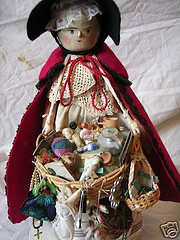The Unassuming Pedlar Doll
In the introduction to Laurence Fontaine's "History of Pedlars in Europe" (1996), the ways in which pedlars have been defined is outlined as such:
"In France, the word was first used to mean one who traversed the town selling pictures and loose printed sheets. Secondly, by some linguistic twist, it was applied to the itinerant rural tradesman who had been known up until then as 'petit mercier' (petty trader), 'porte-balle' (packman), 'marcelot' or 'mercelot' (wandering trader). The first meaning refers to a recognized trade -- albeit an unimportant one -- whereas the second meaning of the word is nothing more than another way of saying 'tramp' or 'trickster.' [...] they were tricksters who wandered from town to town, buying and selling copper and pewter crockery and other similar merchandise which should normally only be sold in the open marketplace."
In France, "the pedlar remained a disturbing figure who was on the fringes of sociey and someone to be guarded against." [...] 'the guilds always viewed them suspiciously', worried that 'they sought, in this manner, to sell off defective merchandise of suspicious origin'.
"In England, the word developed in the opposite direction. 'Chapman' (cheapman) was originally a generic term for anyone who bought and sold merchandise (dealers). [...] In the seventeenth and the first half of the eighteenth century the 'petty chapmen' were described as those who 'buy up commodities of those that sell by wholesale and sell them off dearer by retail, and parcel them out.'"
But "as shops became established in the towns and villages, 'chapman' came to mean [...] a synonym for pedlar or hawker. This term had an equally perjorative connotation: 'Hawking...has its derivation from the spying, thievish habits of the bird and man. They also acquired the reputation for ruffianism and brigandage.
"Right up to the end of the nineteenth century the pedlar was depicted in literature as a rogue, or trickster, half merchant and half thief. He was someone who belonged to another world, who sold both the stuff of everyday life and the stuff of dreams. He came from far away, possessed some secret knowledge and his misdeeds were compensated for by his clever trickery.
"In the nineteenth century, when the profession was dying out, the literary representation of the pedlar underwent a radical transformation. In Britain, in the eyes of the educated Victorians, he ceased to play his traditionally ambiguous and disturbing role and became instead a national hero, embodying the morality of the conservative countryside as opposed to the corruption of the city. In France, religious literature used him in two diametrically opposed fashions; he was either a figure of Evil, an embodiment of temptations to be repudiated, or, because of his freedom, humility and wisdom, he represented the Christ figure."
"In France, the word was first used to mean one who traversed the town selling pictures and loose printed sheets. Secondly, by some linguistic twist, it was applied to the itinerant rural tradesman who had been known up until then as 'petit mercier' (petty trader), 'porte-balle' (packman), 'marcelot' or 'mercelot' (wandering trader). The first meaning refers to a recognized trade -- albeit an unimportant one -- whereas the second meaning of the word is nothing more than another way of saying 'tramp' or 'trickster.' [...] they were tricksters who wandered from town to town, buying and selling copper and pewter crockery and other similar merchandise which should normally only be sold in the open marketplace."
In France, "the pedlar remained a disturbing figure who was on the fringes of sociey and someone to be guarded against." [...] 'the guilds always viewed them suspiciously', worried that 'they sought, in this manner, to sell off defective merchandise of suspicious origin'.
"In England, the word developed in the opposite direction. 'Chapman' (cheapman) was originally a generic term for anyone who bought and sold merchandise (dealers). [...] In the seventeenth and the first half of the eighteenth century the 'petty chapmen' were described as those who 'buy up commodities of those that sell by wholesale and sell them off dearer by retail, and parcel them out.'"
But "as shops became established in the towns and villages, 'chapman' came to mean [...] a synonym for pedlar or hawker. This term had an equally perjorative connotation: 'Hawking...has its derivation from the spying, thievish habits of the bird and man. They also acquired the reputation for ruffianism and brigandage.
"Right up to the end of the nineteenth century the pedlar was depicted in literature as a rogue, or trickster, half merchant and half thief. He was someone who belonged to another world, who sold both the stuff of everyday life and the stuff of dreams. He came from far away, possessed some secret knowledge and his misdeeds were compensated for by his clever trickery.
"In the nineteenth century, when the profession was dying out, the literary representation of the pedlar underwent a radical transformation. In Britain, in the eyes of the educated Victorians, he ceased to play his traditionally ambiguous and disturbing role and became instead a national hero, embodying the morality of the conservative countryside as opposed to the corruption of the city. In France, religious literature used him in two diametrically opposed fashions; he was either a figure of Evil, an embodiment of temptations to be repudiated, or, because of his freedom, humility and wisdom, he represented the Christ figure."

0 Comments:
Post a Comment
<< Home